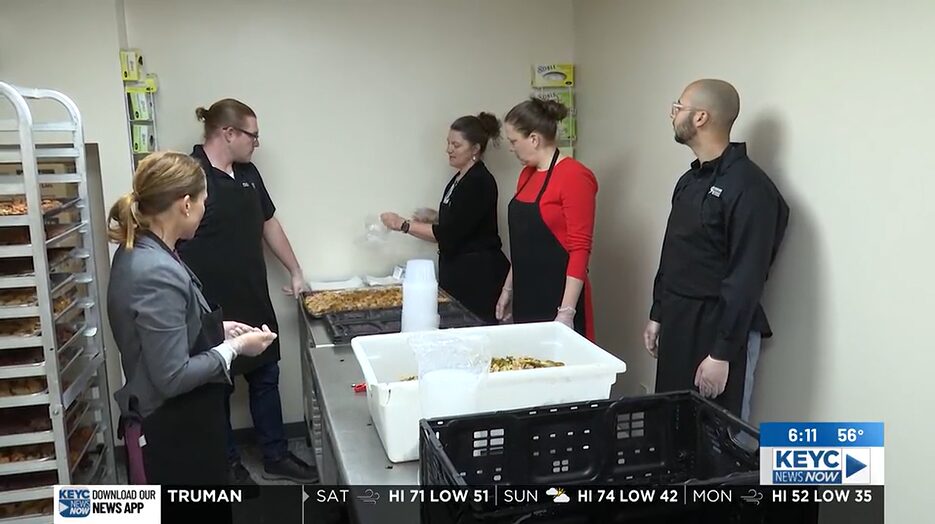Archive for month: January, 2020
Region Nine Development Commission looks for solutions in food and beverage manufacturing capacity challenges
in News/by Region NineMANKATO, Minn. (KEYC) – An agriculture group now finds an apparent lack of capacity for growing Minnesota food and beverage manufacturers to expand when they are ready.
That finding from the Agricultural Utilization Research Institute has prompted a new study from the Region Nine Development Commission to understand what the problems are and what can be done to solve them, according to Region Nine Community and Business Development Specialist Shawn Schloesser.
Region Nine said that if these infrastructure needs are not addressed, there is a risk of losing both the economic benefits that they provide and the possibility of attracting new businesses to the state.
“If you have a product, and you want to manufacture 1,000 of them, but the company that will do that for you will only manufacture 10,000, that gap is too hard for you to close, and so we’re looking for manufacturers that are willing to take on various sizes, the right size for your company,” Schloesser said.
Schloesser said Region Nine is hoping to make small adjustments in the state.
“Whether or not there are things that the State Legislature could do, such as adjustments to regulations,” he said.
The organization, along with AURI, the Minnesota Department of Agriculture and FoodOps, are looking at various trends in their survey.
The goal is to support growth in the industry and create a positive economic impact for the state by looking at strengths, weaknesses, opportunities and threats faced by those in the sector.
“So we’re looking at the licensing portion from the state, the regulations that are in place,” Schloesser said.
Sourcing local ingredients is another trend they are looking at, something Jack Link’s in Mankato tries to do as often as possible, according to Plant Manager Richard Achtziger.
The Mankato location produces roughly 225,000 sticks a week.
As employees work behind the scenes, Achtziger is noticing trends in the industry.
“People are trying to get to the clean label, which is one of the things that we’re doing here as well. As close to pure as you can get,” he said.
Achtziger is also noticing the trend in sourcing local ingredients, something he said there are challenges with.
“It’s not always possible. As I said, it’s a tough market right now, trying to get beef in,” Achtziger said.
The survey is aiming to help mid-sized companies, particularly those with sales from $20,000 to $3 million.
But Region Nine is seeking responses from all state food and beverage manufacturers and hopes to see an increase in employment and income in all sectors tied to the industry.
They also hope manufacturers of all sizes can benefit from the data.
Achtziger said the food and beverage manufacturing industry creates a domino effect impact.
“You know, the cardboard boxes and things like that coming off the forestry industry. You’ve got the meat coming in coming off the agricultural end of it,” he said.
The survey ends on Feb. 5th.
View the KEYC video.
Region Nine Development Commission a Part of a Statewide Food and Beverage Manufacturer Survey
in News/by Region NineSpotlight Interview with Nicole
in News/by Region NineListen to the KTOE interview.
Southern Minnesota Initiative Foundation seeking applications for Prosperity Initiative
in News/by Region NineOWATONNA, MN, January 6, 2020 – Southern Minnesota Initiative Foundation (SMIF), in partnership with Region Nine Development Commission and Faribault Diversity Coalition, is recruiting minority-owned business owners for a new cohort of its Prosperity Initiative.
SMIF is seeking 15 businesses to participate in a 2020 Prosperity Initiative cohort. Past Prosperity Initiative graduates are also encouraged to apply to be part of this program again and take their business to a new level. The program provides directed, culturally sensitive programing, while also creating a unified and coordinated resource structure, informing partners of best practices and creating opportunities for minority populations to network and access the business community. All resources are free for participating businesses. Eligible participants include minorities, women, veterans, persons with disabilities and/or low-income business owners in SMIF’s 20-county region.
SMIF will be hosting a business plan workshop on January 15, 2020, from noon to 2:30 p.m. to help individuals create a business plan for their company. Those interested in the Prosperity Initiative are encouraged to attend so that you have a well-developed business plan to include in your application. If you are interested in attending, please RSVP to Jennifer Heien, Grants Coordinator, at jenniferh@smifoundation.org or (507) 214-7040 by January 13, 2020.
According to the US Census Bureau, 29% of Minnesota’s population in 2040 will be people of color, an increase from only 4% in 1980. In response to this rapid growth, the Prosperity Initiative was designed to provide education and business resources to minority business owners and educate resource partners on the barriers and opportunities these individuals encounter. Since 2016, the Prosperity Initiative program has provided 66 clients with one-on-one business coaching.
The Prosperity Initiative is made possible by generous funding from Wells Fargo and Dan and Angie Bastian.
Apply to the Prosperity Initiative 2020 cohort at www.smifoundation.org/prosperity by January 29, 2020. Contact Pam Bishop, Vice President of Economic Development at SMIF, at pamb@smifoundation.org or (507) 214-7013 with questions.
New Study Explores Minnesota Food & Beverage Manufacturing Capacity
in News/by Region NineRegion Nine Development Commission, in partnership with the Agricultural Utilization Research Institute, the Minnesota Department of Agriculture, and FoodOps, is conducting a survey to identify food and beverage manufacturing trends to support growth in these and related sectors. The goal of the survey is to help create an increased economic impact for the entire state.
The project is in response by the AURI to an apparent lack of capacity or access to affordable, right-sized manufacturing options in Minnesota for growing, ready-to-scale small food and beverage businesses. Failure to address these infrastructure needs places the state at risk of losing not only the economic benefit these businesses provide today such as jobs, revenue, capital, and agricultural product utilization, but also minimizes the economic potential of attracting new food and beverage businesses to the state.
Survey Participants:
The intended audience of this survey are those in the food and beverage manufacturing sectors within the state of Minnesota, regardless of annual sales volume, that is defined by the standard industrial classifications system, Food and Kindred Products used by the United States Department of Labor.
Anticipated Project Benefits to Minnesota:
• Identification of the real and perceived strengths, weaknesses, opportunities, and threats faced by food and beverage manufacturers and related sectors.
• Potential increases in employment and income in all sectors tied to the food and beverage manufacturing sectors, which may result in economic growth for the state.
• Ability to gain resilience in all related sectors by understanding what opportunities and threats exist, how those challenges could be mitigated, and opportunities pursued.
• Identification of opportunities for domestic and international investment benefits in Minnesota by adding the state’s economic growth and resilience.
• Food and beverage manufacturers of all sizes benefit from a study of their environment and new data resources and guides.
• Minnesota will benefit by identifying ways to potentially grow the food and beverage manufacturing sector, which may result in economic growth in multiple related industrial sectors.
• Creation of an assessment report to support the expansion of mid-sized companies with sales from $20,000 to $3 million as well as related industrial sectors.
• Provide assistance and insight to the state legislature in crafting and refining policies which offer the right amount of regulation and support to maintain level opportunities for all.
Access the Survey:
The survey is currently open and will be available to participants until February 5, 2020. To participate in the survey, please visit https://www.rndc.org/food-and-beverage-manufacturing-assessment/
For specific questions regarding the survey or study, please contact Shawn Schloesser at shawn@rndc.org or 507.389.8886.
SMIF seeking initiative applications
in News/by Region NineSMIF is seeking 15 businesses to participate in a 2020 Prosperity Initiative cohort. Past Prosperity Initiative graduates are also encouraged to apply to be part of this program again and take their business to a new level. The program provides directed, culturally sensitive programing, while also creating a unified and coordinated resource structure, informing partners of best practices and creating opportunities for minority populations to network and access the business community. All resources are free for participating businesses. Eligible participants include minorities, women, veterans, persons with disabilities and/or low-income business owners in SMIF’s 20-county region.
SMIF will a business plan workshop from noon to 2:30 p.m. Jan. 15 to help individuals create a business plan for their company. Those interested in the Prosperity Initiative are encouraged to attend so they have a well-developed business plan to include in their application. If interested in attending, RSVP to Jennifer Heien, grants coordinator, at jenniferh@smifoundation.org or 507-214-7040 by Monday.
Apply to the Prosperity Initiative 2020 cohort at www.smifoundation.org/prosperity by Jan. 29. Contact Pam Bishop, vice president of economic development at SMIF, at pamb@smifoundation.org or 507-214-7013 with questions.
According to the U.S. Census Bureau, 29% of Minnesota’s population in 2040 will be people of color, an increase from only 4% in 1980. In response to this rapid growth, the Prosperity Initiative was designed to provide education and business resources to minority business owners and educate resource partners on the barriers and opportunities these individuals encounter. Since 2016, the Prosperity Initiative program has provided 66 clients with one-on-one business coaching.
The Prosperity Initiative is made possible by funding from Wells Fargo and Dan and Angie Bastian.
Latest Posts
 MPCA Speaks of Benefits of Reducing Food WasteApril 16, 2025 - 3:33 pm
MPCA Speaks of Benefits of Reducing Food WasteApril 16, 2025 - 3:33 pm RNDC Receives $100,000 Grant for Regional Effort to Rescue Surplus Food for Food ShelvesDecember 20, 2024 - 11:42 am
RNDC Receives $100,000 Grant for Regional Effort to Rescue Surplus Food for Food ShelvesDecember 20, 2024 - 11:42 am Beyer named deputy director for Region Nine Development CommissionDecember 20, 2024 - 10:48 am
Beyer named deputy director for Region Nine Development CommissionDecember 20, 2024 - 10:48 am
Contact Us
- 3 Civic Center Plaza, Suite 310
- Mankato, MN 56001
- (507) 387–5643
- Mon – Fri 8:00 – 4:30
Fridays from Memorial Day through Labor Day
we are open until 3:30.
The RNDC office is closed most major holidays. Please go to the Calendar for more information.
Our staff follows a hybrid schedule. Please call ahead or contact an RNDC staff member to schedule a meeting.
Join Our Newsletter
Categories
- Archive (3)
- Miscellaneous (5)
- News (172)
- Newsletter (88)
- RNDC Policies (3)

